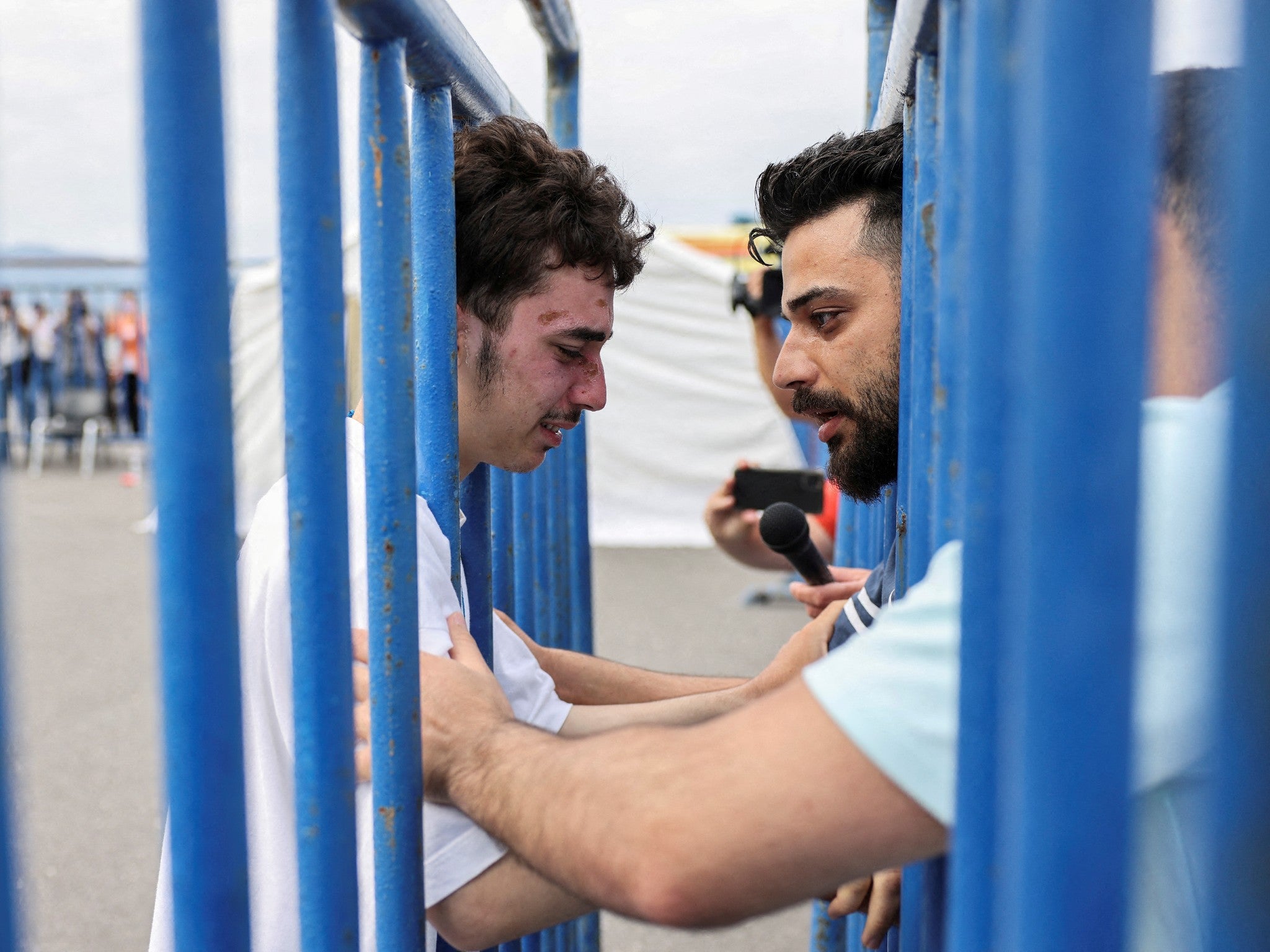Emotional reunion for Greek boat disaster survivor – as coastguard denies reports tow led to tragedy
Officials suggest search and rescue operations will extend past the usual 72 hours, but no survivors have been found past initial 104

A Syrian teenager who survived a shipwreck that killed at least 78 people off the coast of Greece was reunited with his elder brother on Friday.
Mohammad, 18, burst into sobs as he spotted his elder brother Fadi, who had travelled from the Netherlands searching for him. They wept and hugged through metal barricades, erected by Greek police around a warehouse in Kalamata where survivors had been sleeping for the past two days.
“Thank God for your safety,” Fadi said, repeatedly kissing his younger sibling on the head.
About 25 other relatives gathered outside the Kalamata shelter, hoping for news, clasping screenshots of their loved ones on mobile phones.
Witness accounts suggested between 400 and 750 people – including potentially up to 100 children – had packed the 20- to 30m-long fishing boat that capsized and sank early on Wednesday morning about 45 miles from the southern coastal town of Pylos.
The Greek coastguard denied reports that the boat flipped after the coastguard attempted to tow it, as criticism mounted over both the response of Greek authorities and the years-long failure of the EU to hammer out a migration policy.
“There was no effort to tug the boat,” coastguard spokesperson Nikos Alexiou told state broadcaster ERT.
A massive search and rescue operation continued on Friday, but hopes are dwindling of finding any more survivors – despite the fact that the Greek coastguard suggesting the operation could be extended beyond the standard 72 hours. The area where the boat capsized contains some of the deepest waters of the Mediterranean.
In the immediate aftermath, 104 survivors and 78 victims were brought to shore by Greek authorities, but nothing has been found since.
Most of the survivors, 71 people, were transferred on Friday by bus to the migrant camp of Malakasa, a gated facility with barbed wire fencing 40km (25 miles) outside Athens.
“It’s a tragedy,” said Anwar Bakri, secretary general of the Syrian Association of Greece. “I have numerous photos, at least 15 photos until now, of missing people, young children, 16-year-olds, 20-year-olds, 25-year-olds, whose parents are looking for them."
Mr Bakri said he had received “hundreds of calls” from people in Germany, in Turkey and other countries, who feared their Syrian relatives were on the sunken boat.
“From what I was told, there are no women. All the women died, they sank, they drowned with their children in their arms.”
The UN’s migration and refugee agencies issued a joint statement calling timely maritime search and rescues “a legal and humanitarian imperative” and calling for “urgent and decisive action to prevent further deaths at sea”.
The International Organisation for Migration (IOM) and the United Nation’s refugee agency, the UNHCR, said the latest tragedy in the Mediterranean was the worst in several years and urged states to address the gaps in search and rescue rules.
“It is clear, that the current approach to the Mediterranean is unworkable,” IOM’s Federico Soda. “Year after year, it continues to be the most dangerous migration route in the world, with the highest fatality rate.”
Pope Francis, who visited Greece two years ago to draw attention to the plight of refugees, urged for measures to prevent similar incidents in the future.
“I feel great pain at the death of the migrants, including many children, in the shipwreck in the Aegean Sea,” he said on Twitter. “We must do everything possible so that migrants fleeing war and poverty do not meet death while seeking a future of hope.”
The ageing fishing vessel was thought to have departed from Egypt, then picked up passengers in the Libyan coastal city of Tobruk on 10 June. Greek authorities say survivors have told them they paid $4,500 (£3,500) each to go to Italy. The exact circumstances of the vessel sinking while it was being shadowed by the Greek coastguard are still unclear.
Authorities, who were alerted by Italy on Tuesday and subsequently monitored the vessel over a period of 15 hours before it sank, say occupants on the vessel repeatedly refused Greek help, saying they wanted to go to Italy.
An advocacy group that had been in communication with the vessel said that on at least two occasions persons on board pleaded for help. The group, Alarm Phone, said it had alerted Greek authorities and aid agencies hours before the disaster unfolded.
Nine Egyptians, aged between 20 and 40 years, were arrested over the shipwreck on Thursday evening. Authorities said they faced charges of negligent manslaughter, exposing lives to danger, causing a shipwreck and human trafficking.
They were expected to appear before a judge and respond to the accusations in the coming days.
Reuters
Join our commenting forum
Join thought-provoking conversations, follow other Independent readers and see their replies
Comments
Bookmark popover
Removed from bookmarks